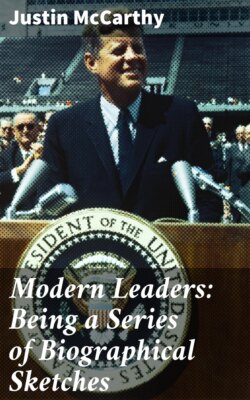Modern Leaders: Being a Series of Biographical Sketches

Реклама. ООО «ЛитРес», ИНН: 7719571260.
Оглавление
McCarthy Justin Huntly. Modern Leaders: Being a Series of Biographical Sketches
Modern Leaders: Being a Series of Biographical Sketches
Table of Contents
INTRODUCTION
QUEEN VICTORIA AND HER SUBJECTS
THE REAL LOUIS NAPOLEON
EUGENIE, EMPRESS OF THE FRENCH
THE PRINCE OF WALES
THE KING OF PRUSSIA
VICTOR EMANUEL, KING OF ITALY
LOUIS ADOLPHE THIERS
PRINCE NAPOLEON
THE DUKE OF CAMBRIDGE
BRIGHAM YOUNG
THE LIBERAL TRIUMVIRATE OF ENGLAND
THE ENGLISH POSITIVISTS
ENGLISH TORYISM AND ITS LEADERS
"GEORGE ELIOT" AND GEORGE LEWES
GEORGE SAND
EDWARD BULWER, LORD LYTTON
"PAR NOBILE FRATRUM—THE TWO NEWMANS."
ARCHBISHOP MANNING
JOHN RUSKIN
CHARLES READE
THE EXILE-WORLD OF LONDON
THE REVEREND CHARLES KINGSLEY
MR. JAMES ANTHONY FROUDE
SCIENCE AND ORTHODOXY IN ENGLAND
Отрывок из книги
Justin McCarthy
Published by Good Press, 2021
.....
SCIENCE AND ORTHODOXY IN ENGLAND.
England has, just now, something very nearly approaching to manhood suffrage; and to manhood suffrage it will probably come before long. The ballot will, doubtless, be introduced. The Irish Church is as good as dead. I cannot doubt that the English State Church will, ultimately, and before very long, succumb to the same fate. Not that this logically or politically follows as a matter of necessity; and nothing could be more unwise in the interest of their own cause than the persistency with which the Tories keep insisting that the doom of the one is involved in the doom of the other. The Irish Church is the foreign church of a miserably small minority; the English Establishment is the Church of the majority, and is an institution belonging to the soil. The very principle which maintains the English Church ought of right to condemn the Irish Church. But it is the fact that an agitation more influential than it seemed to the careless spectator, has long been going on in England for the abolition of the State Church system altogether; and there can be no doubt that the fate of the Irish Establishment will lend immense courage and force to that agitation. Revolutionary movements are always contagious in their nature, and the movement against the Irish Church is in the strictest sense revolutionary. The Dutch or the Scotch would have carried such a movement to triumph across rivers of blood if it were needful; and no man of spirit could say that the end would not be worth the cost. I assume, then, that the overthrow of the Irish Church will inflame to iconoclastic fervor the movement of the English Dissenters against all Church establishments. I do not stop just now to inquire whether the movement is likely to be successful or how long it may take to accomplish the object. To me, it seems beyond doubt that it must succeed; but I do not care to assume even that for the purpose of my present argument. I only ask my readers to consider the condition of things which will exist in England when a movement resting on a suffrage which is almost universal, a movement which will have already overthrown one State Church within Great Britain, proceeds openly and exultingly to attack the English Church itself, within its own dominions. I ask whether it is likely that the institution which is supposed to be bound up inseparably with that Church, the Monarchy which is based upon, and exists by virtue of religious ascendency, is likely to escape all question during such a struggle, and after it? The State Church and the Aristocracy, if they cannot always be called bulwarks of the throne, are yet so completely associated with it in the public mind that it is hard even to think of the one without the others, and yet harder to think of the one as existing serene and uninjured after the decay or demolition of the others.
.....